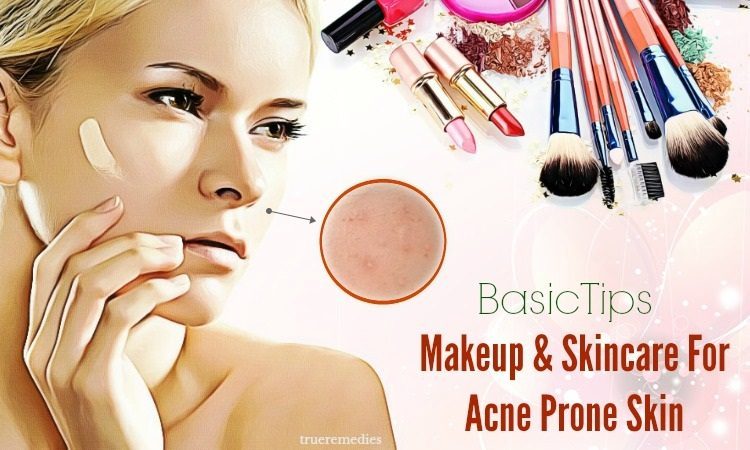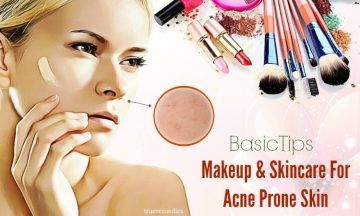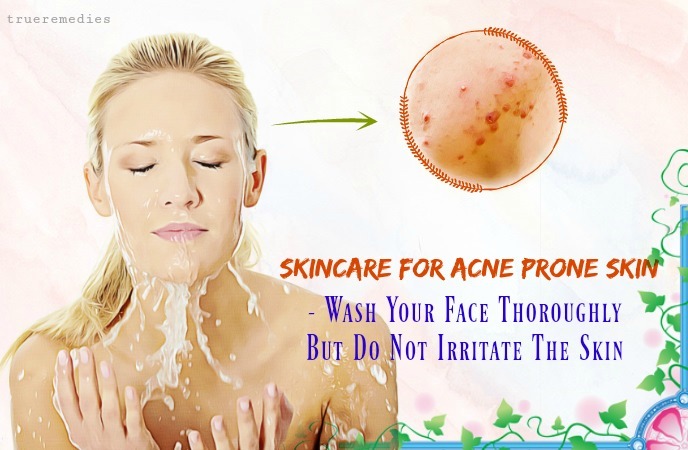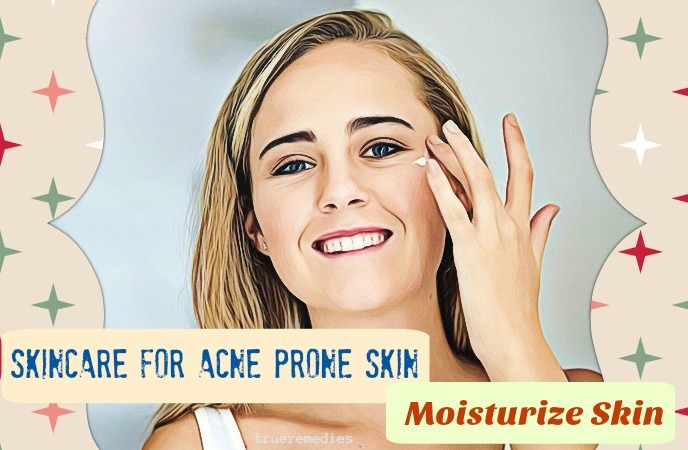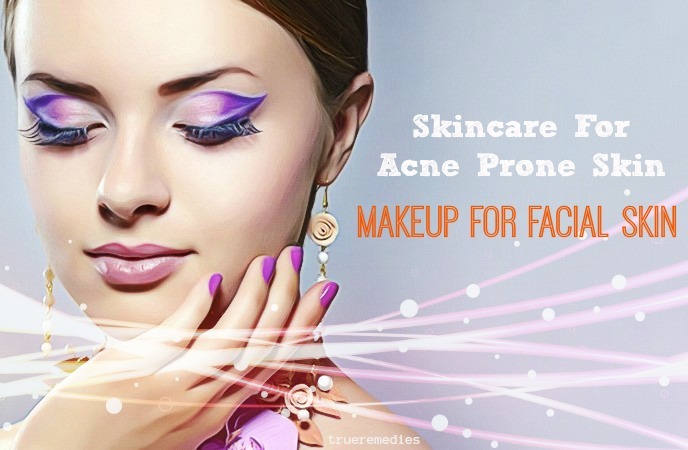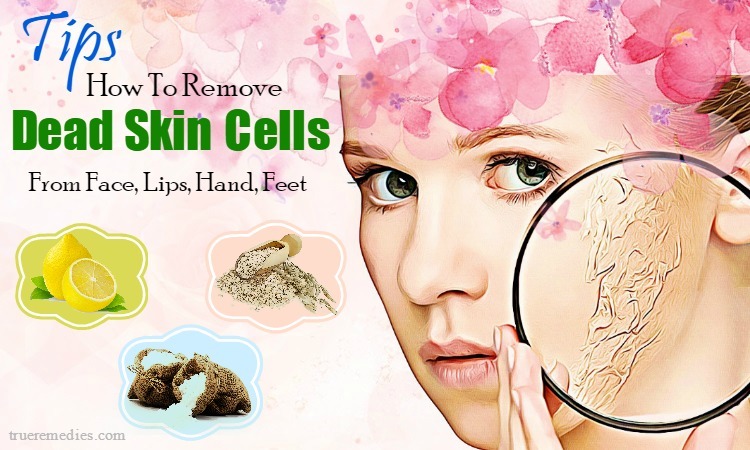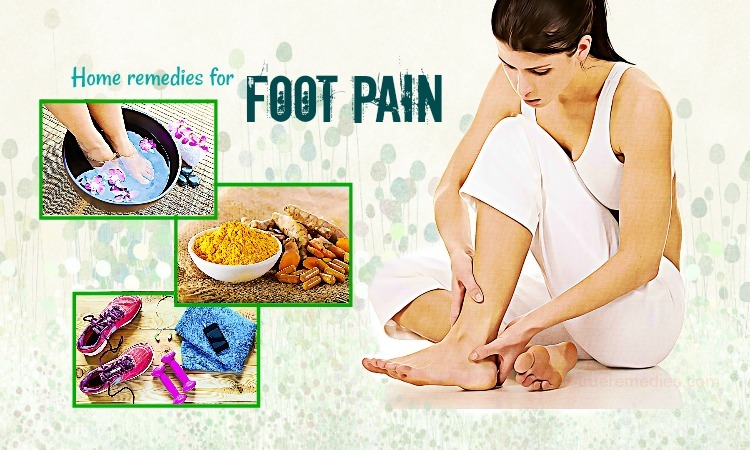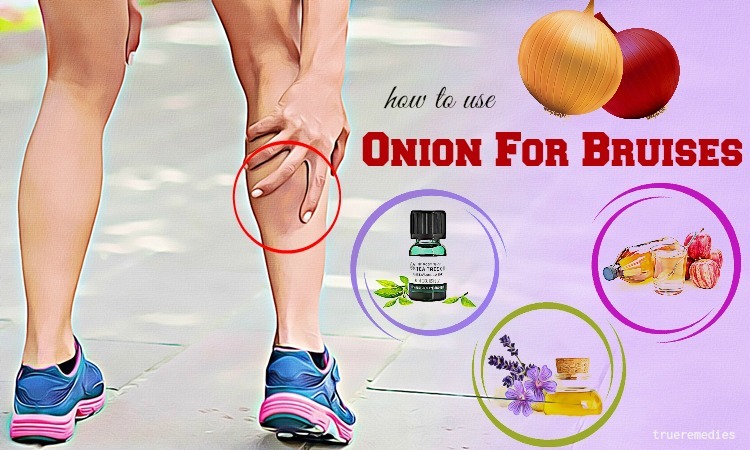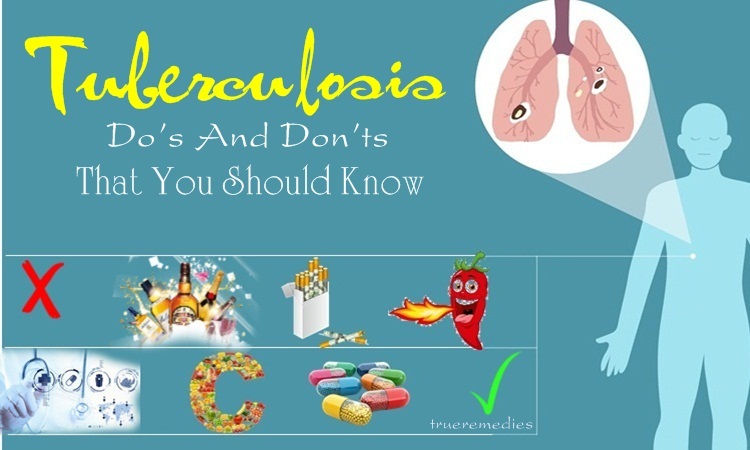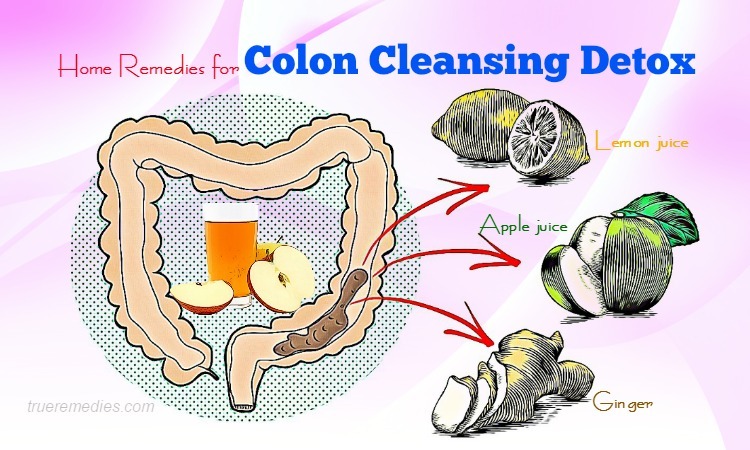Updated: 11/12/2019
Contents
Acne is a skin problem that most people experience a few times in their life. Although there are many ways to cure these nasty acne spots, from applying strict diet to use of drugs, acne still needs a lot of time to be completely removed. People with acne prone skin are often afraid of makeup. The reason is because after makeup, they are very prone to acne, and acne makes their make-up look so ugly. If you are one of them, do not worry, this article will help you get rid of this anxiety. Although our tips on makeup and skincare for acne prone skin below can help you reduce acne severity and hide them, acne treatment is essential. To do this, let’s find out some information about acne.
What Is Acne Prone Skin?
Acne is a disorder arising from the activity of hormones and other substances on the glands of oily skin (sebaceous glands) and hair follicles. Factors that lead to skin pore penetration into the skin and the outbreak of the lesions are often referred to as acne. Acne usually appears on the face, neck, back, chest, and shoulders. Although acne is not usually a serious health threat, it can lead to a lack of confidence. In severe cases, acne can lead to permanent scarring.
Acne is caused by a variety of causes, depending on your condition. However, one important factor is the increase in hormones in the body. This increase causes the body to produce more sebaceous glands, leading to the formation of acne. Hormonal changes caused by pregnancy or using birth control pills can also cause acne. Another factor that affects the formation of acne is the genetic factor. Not only that, some androgenic and lithium-containing drugs or oil-containing cosmetics are also the cause of acne [1] [2].
If you have normal skin type, congratulations, you rarely have trouble with acne. Here are some types of acne prone skin:
- Dry Skin
Dry skin is a skin type that produces less oil than normal skin. If you have dry skin, you will often face cracks, roughness, wrinkles and freckles. The reason is because sebaceous glands on the skin to operate poorly, producing less oil. This causes the skin to lack oil and moisture on the skin is not balanced. Therefore, the skin is prone to acne.
TrueRemedies Partner Solutions

Need a Help from the Leading Expert Online, Available 24/7?
They’re all here and ready to answer your questions online or by phone. Keep asking questions until you get the answer you need.
- Oily Skin
Oily skin is most prone to acne. Oily skin is the type of skin that produces too much oil compared to normal (also known as excess sebum secretion). The production of sebum on the skin moisturizes and soothes the skin. However, oily skin produces too much sebum, making the skin look glossy and wet at times. Excessive oil will allow dirt and bacteria to penetrate, clog skin pores and promote acne formation. So people with oily skin often struggle with acne.
- Combination Skin
Combination skin is the type of skin which synthesizes the above skin types. If you have this type of skin, the skin on your chin, nose and forehead is often oily, while the other skin is very dry. Combination skin is also prone to acne and large skin pores.
What Are Common Causes Of Acne Prone Skin?
Here are common causes of this skin condition:
- Living Environment
Weather changes not only affect fashion but also affect your skin, especially when it is cold. In winter, cold air combined with air conditioning (and movement between two air zones) can make the skin dehydrated and become more sensitive. This makes skin prone to acne.
- Dust And Pollution
Dust and pollution (such as exhaust, smoke and dust) can make your skin feel irritated and dirty. During the day, dirt in the air can cling to the skin and is absorbed by the skin's natural defense. Over time, the dirt can irritate and weaken the natural protective layer of the skin, leaving the skin unable to perform its function and become prone to acne.
- Hard Water
Hard water contains high levels of minerals such as iron, magnesium, calcium and high alkalinity. You may notice signs of hard water around the faucet, sink and in the warmth through the lime scale. Imagine what happens when you use that water for your skin? Besides, washing in hard water can make the skin more irritated.
- Skin Care Way
Excessive skin cleansing with inappropriate products can irritate the skin and cause acne. Be careful in your skin care way, avoid excessive cleansing and avoid irritating cleanser products. If you choose the right product for your skin type, cleansing can really help improve the skin's protective function and reduce the sensitivity, so choosing the right skin care product is very important.
- Life Style
Your lifestyle plays an important role in the health of your skin. Staying up late, inadequate sleep, working in an air-conditioned office and smoke can affect the skin. Other factors such as chlorine in the swimming pool or moving a lot on the plane can also affect your skin, making the skin susceptible to acne.
What Are Common Symptoms Of Acne Prone Skin?
Here are common symptoms of this skin condition:
- Skin is pale, not fresh
- Acne often appears with blackheads and whiteheads
- Skin is often prone to red rash
- Skin is often reddened in skin areas of nose, forehead and chin due to dilated blood vessels
- Skin care products and cosmetics often cause your skin to feel irritated
You may experience other symptoms not mentioned. If you have any questions about the signs of the disease, please consult your doctor.
Who Is At High Risk Of Acne Prone Skin?
People with poor skin care regimen are often prone to acne.You can control this problem by minimizing risk factors. Please see your doctor for more information.
What Are Common Acne Prone Skin Treatments?
Here are some common ways to prevent and treat oily skin:
- Wash Your Face Twice A Day
Keeping your face clean is important in preventing acne. Cleansing helps remove oil, dirt and excess oil build up on the skin surface. You should wash your face twice a day in the morning and evening with a mild cleanser, then use a dry clean towel to dry the skin.
- Use Non-Comedogenic Moisturizer (Does Not Clog Pores)
Applying a good moisturizer is very important after cleansing, as it will moisturize and prevent dryness and irritation. However, if you have trouble with acne, you should choose a moisturizer that suits your skin type. A dense moisturizer that contains a lot of oil can exacerbate your pores and cause acne. Therefore, look for “non-comedogenic” moisturizers to treat your condition.
- Do Not Touch Your Face
During the day, your hands are exposed to dirt and bacteria more than other parts of the body. Therefore, you should not touch your face. In addition to spreading bacteria and causing infections, touching the acnes also makes them prone to irritation and swelling.
- Apply Exfoliation And Mask Once A Week
Exfoliating and masking products are useful for the skin, but should not be used too much. Exfoliating products help remove dead skin cells to effectively cleanse the skin, but will also dry out and irritate skin if used regularly, especially for acne prone skin.
When To See A Doctor?
You should see a doctor if your skin condition becomes very severe and you cannot overcome this. Acne prone skin may not be caused by skin problems but rather by the effects of certain diseases.Besides, if you have any any questions, please consult your doctor. Each person's condition is different, so please consult your doctor to select the most suitable option.
Above is the basic information about acne as well as acne prone skin that you should know. Here we show you how to get a perfect make-up without having to worry about acne. Take a look at TrueRemedies.com!
10 Basic Tips On Makeup And Skincare For Acne Prone Skin
1. Wash Your Face Thoroughly But Do Not Irritate The Skin
This is the first tips on the best makeup and skincare for acne prone skin. Cleansing your face is the first step of makeup. For a perfect make-up, you cannot leave your skin with excess oil and dirt. Although this step is very important, not everyone knows how to clean the face without stimulating the skin. The use of facial cleansers sometimes causes itchy skin. This is one of the reasons for the weakened skin, while making the makeup is not natural. The result is that you are prone to acne. If this is the case, let’s choose a cleanser specifically for sensitive skin. They are able to cleanse the skin gently without causing redness.
Besides, you should also wash your face with water at room temperature. Water that is too hot or too cold can damage the skin, leaving the skin cells in shock. Instead, use water at room temperature and wash the entire face. If soap is still on your face, wash your face with water again. If still on the face, soap can clog the pores (like excess oil and makeup). This causes your skin to get acnes, and at the same time, it weakens the skin. Therefore, after washing face, always make sure that you completely remove all soap on your skin.
2. Skincare For Acne Prone Skin – Removes Dead Skin Cells Gently
When it comes to makeup and skincare for acne prone skin, exfoliating skin gently is important. After cleansing your face, what you need to do is skin exfoliation. You need to do this 1-2 times a week. This will make your skin white, soft and smooth. As a result, your make-up will become more natural. A great problem for people with acne prone skin is that improper exfoliation is very easy to cause skin damage [3].
Exfoliating products often exert strong effects on the skin to remove dead skin cells, excess oil and dirt. This can cause skin to wear out. Therefore, if you have acne prone skin, exfoliating products that are sold on the market are not suitable for you. Fortunately, we have found a solution to this problem. Instead of using exfoliating products, use natural ingredients. Natural ingredients still have the ability to remove dead skin cells very well without causing skin irritation. Here are some suggestions for you:
Method 1. Brown Sugar And Lemon Juice
To apply this method, please follow these steps below:
- Wash your face thoroughly with cleanser
- Mix brown sugar with lemon juice to form a thick mixture
- Apply the mixture to the skin, massage gently for 3-5 minutes
- Wash your face thoroughly with cool water
You can do this 1-2 times a week.
Method 2. Sea Salt And Lemon Juice
To apply this method, please follow these steps below:
- Wash your face thoroughly with cleanser
- Mix 2 teaspoons sea salt with 1/2 teaspoon of lemon juice, stir well
- Apply the mixture to the skin, massage gently for 3-5 minutes
- Wash your face thoroughly with cool water
You should apply this method 1-2 times a week to gently remove dead skin cells.
Method 3. Honey And Green Tea
To apply this method, please follow these steps below:
- Wash your face thoroughly with cleanser
- Mix honey with green tea in a ratio of 1:1, stir well
- Apply this solution to the skin, massage gently for 3-5 minutes
- Wash your face thoroughly with cool water
Please apply this method 1-2 times a week before going to bed to get the best results.
Method 4. Coffee Grounds And Coconut Oil
To apply this method, please follow these steps below:
- Wash your face thoroughly with cleanser
- Mix 100g coffee grounds with ½ teaspoon of coconut oil, stir well
- Apply this mixture to the skin, massage gently for 3-5 minutes
- Wash your face thoroughly with cool water
You can apply this method 1-2 times a week.
3. Moisturize Skin
Regarding skincare for acne prone skin, properly skin moisturizing is essential. After cleansing and removing dead skin cells, to soothe the skin, you need to quickly moisturize the skin. Use a high quality moisturizer for the skin. If the cleanser irritates the skin, it probably removes too much oil on the skin. Moisturizers will add good oil to the skin and help the skin retain its moisture. Skin dehydration causes itching, dryness, flaking and discomfort. The key to have a good skin care routine is the use of high quality moisturizers. Choose moisturizers that contain urea, alpha hydroxy acids (also called lactic acid or glycolic acid), glycerine, or hyaluronic acid in the ingredients. If the cream you choose has these ingredients, it's a very good moisturizer. Using it before makeup will make your makeup layer always glowing.
Read more: 14 Best Essential Oils For Dry Skin Rash On Face, Hands & Feet
4. Skincare For Acne Prone Skin – Apply Aloe Gel
Aloe Vera is a wonderful plant. It soothes the skin in most skin problems – such as sunburn, dryness and irritation. It is often used to moisturize the skin. On hot days, you can skip this tip. However, for dry and cold day, Aloe Vera gel will be a powerful aid which will keep your skin moist and help the makeup firmly on the skin.
You can use fresh Aloe Vera gel or use Aloe Vera gel sold in the market. Make sure the product you buy is manufactured by a reputable company. After using a moisturizer for the skin, wait about 5 minutes for the ingredients of the moisturizer to penetrate into the skin. Then, apply a thin layer of Aloe Vera gel to your skin.
Don’t skip: 24 Best Kept Japanese Skin Care Secrets And Routines
5. Use Sunscreen
The next tip in this list of the best tips on skincare for acne prone skin is using sunscreen. Many people do not have a habit of using sunscreen before makeup because they think the makeup layer can protect the skin from the effects of sunlight. But this thought is totally wrong. Makeup layer can hardly protect the skin from any elements of the environment, including sunlight, smoke, and dust. Therefore, if you do not use sunscreen before makeup, the formation of acne is unavoidable. Besides, you should not overdo the sunscreen. Just applying a thin layer of sunscreen on the skin is enough. Sunscreen with an SPF of at least 50 is what you should use. After about every 2-3 hours, you need to apply a layer of sunscreen on the skin.
6. Skincare For Acne Prone Skin – Carefully Check Cosmetics Ingredients
When choosing products of makeup and skincare for acne prone skin, checking ingredients used is crucial. This is a very necessary step, especially if you have acne prone skin. In particular, you should not buy “fragrance-free” or “unscented” cosmetics. According to experts, these products often contain flavors to hide the smell of chemicals. Although cosmetic preservatives (such as phenoxyethanol, formaldehyde and paraben) can irritate the skin, water-based cosmetics still need to contain them to prevent bacterial growth. In addition, compare the number of ingredients on the label of cosmetic products and choose the categories with less than 10 ingredients to avoid damaging your skin.
7. Makeup For Facial Skin
Makeup and skincare for acne prone skin is mainly related to facial skin. The first point that you should note is the use of makeup primer. Makeup primer will reduce the damage of cosmetics on your skin, while concealing the skin. This makes the makeup layer look more natural and stays on the skin longer. In addition, choose a blue concealer to cover bruises and swelling or pink concealer to cover dark brown areas on the sensitive skin. Then, apply a layer of powder on the skin to help the concealer stay on the skin longer. You should choose the powder with the same color as your skin color.
Also read: 8 Best Minerals & Vitamins For Dry Skin On Face, Lips & Hands
8. Skincare For Acne Prone Skin – Eye Makeup
No wonder, this one that should definitely be mentioned in this list of best tips on makeup and skincare for acne prone skin. The eyelid is the most sensitive area of the face. Acne usually appears around the eyelid after you apply makeup. You should choose light colored eye shadow powder, because it has less pigmentation which irritates the eyelid. Do not use eye shadow powder which contains emulsion. If using eyeliner, you should choose a pencil eyeliner instead of a liquid eyeliner. Many liquid types of eyeliner contain latex, which can cause allergic reactions on sensitive skin. Besides, you should also choose black mascara. This limits the irritation to the eyelid.
9. Makeup For Lips
The next one in this list of the best tips on makeup and skincare for acne prone skin is makeup for lips. Your lips are not as sensitive as other areas of your face, but you should also be careful when applying lipstick, otherwise you may face cracked lips. If your lips are very sensitive, use a lip balm and lipstick that contains moisturizing ingredients. Avoid persistent lipstick because its ingredients are easy to cause allergic reactions, affecting your sensitive skin.
Learn more: 24 Natural Remedies For Sun Damaged Skin Treatment At Home
10. Skincare For Acne Prone Skin – Remove Makeup When Coming Home
Last but not least important in regard to makeup and skincare for acne prone skin is makeup removal. As soon as you return home, remove your make-up with a make-up remover. Use a mild make-up remover which can cleanse the skin but do not make it dry out. Then wash your face thoroughly with a cleanser and nourish your skin with a mask. This will soothe your skin, limiting the formation of acne. Do not forget to moisturize your skin carefully before going to bed.
Above are simple tips to help you have a perfect makeup without affecting your acne prone skin. These are all very useful tips, so do not ignore them. Let’s apply them to see how effective they are. If you have any contributing ideas about our article of “10 Basic Tips Makeup And Skincare For Acne Prone Skin” introduced in SkinCare Category, do not hesitate to drop your words below this post. We will answer as soon as we could.

